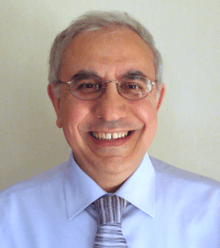M. Amin Arnaout
| M. Amin Arnaout | |
|---|---|
 M. Amin Arnaout | |
| Nationality | American |
| Fields | Biology, Immunology, Medicine, Nephrology, Structural Biology |
| Institutions |
Massachusetts General Hospital Harvard Medical School Children's Hospital Boston Johns Hopkins University |
| Alma mater | American University of Beirut |
| Academic advisors | Fred S. Rosen, MD |
| Known for | Integrins |
|
Website www | |
M. Amin Arnaout, M.D. is a physician-scientist and nephrologist best known for seminal discoveries in the biology and structure of integrin receptors. He is Professor of Medicine at Harvard Medical School and physician at the Massachusetts General Hospital (MGH). As the longest-serving Chief of Nephrology at MGH (1998-2013), he led that division to become the largest academic nephrology program in the United States, ranking first or in the top five throughout his tenure.[1]
Education and Training
Arnaout was an undergraduate at the American University of Beirut (AUB), Lebanon. He received his Medical Degree from AUB Medical School, and his further training in internal medicine, immunology, and nephrology from Johns Hopkins University, Children's Hospital Boston, and Brigham and Women's Hospital.
Research
Dr. Arnaout’s research on the biology and structure of integrins has led to scientific observations that span the entire spectrum from gene discovery to 3-dimensional protein structure to clinical translation. He described an inherited deficiency in leukocyte adhesion in a lead article in the New England Journal of Medicine;[2] defined the biochemical and molecular basis of this disease, which he traced to a deficiency in a family of leukocyte receptors, now known as leukocyte integrins[3][4] and elucidated the role of these cell adhesion molecules in the immune system.[5] He was also the first to determine the crystal structures of integrins.[6][7][8][9][10] His molecular and structural studies in integrins were instrumental in understanding the processes involved in organ development, maintenance of organ architecture and homeostasis in the adult, cancer growth and metastasis, and the response of organs to acute and chronic inflammatory or autoimmune injury. For example, in the kidney, integrins are now known to be critical in maintaining the kidney filtration barrier thus preventing loss of blood and proteins in the urine,[11] and also mediate the respiratory distress observed in kidney failure patients when hemodialyzed using cuprophane membranes.[12] Arnaout's current research aims at translating his discoveries in integrin biology and structure into novel and safer drugs for treating inflammatory, thrombotic, fibrotic and autoimmune diseases and cancer, using structure-based drug design.[13][14]
His research on cell adhesion and integrins has been described as "concomitantly advancing the field one enormous stride,"[15] as "one of those spectacular results that will change a field",[16] a "MIDAS touch to cell signaling"[17] and has been featured in the lay press including the New York Times .
Dr. Arnaout also made important contributions in other scientific fields. He was the first to show that C3 nephritic factor is an autoantibody that activates the alternative complement pathway,[18][19] a finding that suggested the potential of B cell or complement C5 depletion as adjunct therapies in certain forms of kidney inflammation. He was also the first to identify the antigen targeted by autoantibodies in patients with systemic vasculitis,[20] which formed the basis for a routinely used diagnostic assay. He was the first to show that polycystin-1, one of two gene products mutated in patients with Autosomal Dominant Polycystic Kidney Disease (ADPKD), is required for the structural integrity of blood vessels,[21] indicating that the early onset of high blood pressure and presence of vascular aneurysms in ADPKD is caused by a primary defect in vascular polycystin-1. In collaborative studies, he also showed that polycystin-2, the other gene product defective in ADPKD, is a TRP-like calcium channel,[22] providing new insights into the molecular pathogenesis of ADPKD and potential pathways to therapeutic interventions.
Awards and Honors
Dr. Arnaout has won several awards, including the Young Investigator Award from the National Institutes of Health , the Established Investigator Award from the American Heart Association , and the Presidential Medal of Excellence from the American Society of Nephrology .
Dr. Arnaout is an elected member of several academic societies including the American Society for Clinical Investigation (ASCI) and the Association of American Physicians (AAP).
References
- ↑ U.S. News & World Report
- ↑ N Engl J Med. 1982 Mar 25;306(12):693-9
- ↑ J Clin Invest. 1984 Jan;73(1):153-9
- ↑ J Clin Invest. 1984 Oct;74(4):1291-300
- ↑ Immunol Rev. 1990 Apr;114:145-80
- ↑ Cell. 1993 Mar 26;72(6):857-67
- ↑ Cell. 1995 Feb 24;80(4):631-8
- ↑ Science. 2001 Oct 12;294(5541):339-45
- ↑ Science. 2002 Apr 5;296(5565):151-5
- ↑ Current Biology. 2002 May 14;12(10):R340-2
- ↑ N Engl J Med. 2013 Dec 19;369(25):2416-23
- ↑ N Engl J Med. 1985 Feb 21;312(8):457-62
- ↑ J Immunol. 2011 Dec 15;187(12):6393-401
- ↑ Nat Struct Mol Biol. 2014 Apr;21(4):383-8
- ↑ Science 294, 316-7 (2001)
- ↑ Science 293, 1743-46 (2001)
- ↑ Nature Reviews, 3, 313 (2002)
- ↑ J Immunol. 1977 Oct;119(4):1316-20
- ↑ N Engl J Med. 1977 Jul 21;297(3):144-5
- ↑ Blood. 1989 Nov 1;74(6):1888-93
- ↑ Proc Natl Acad Sci U S A. 2000 Feb 15;97(4):1731-6
- ↑ Proc Natl Acad Sci U S A. 2001 Jan 30;98(3):1182-7